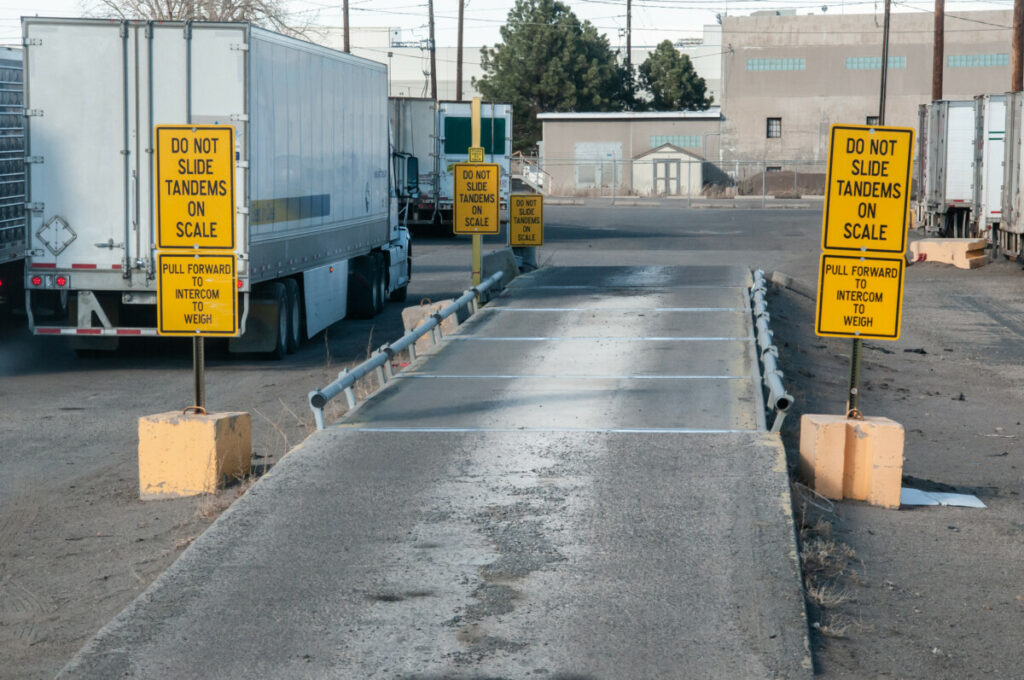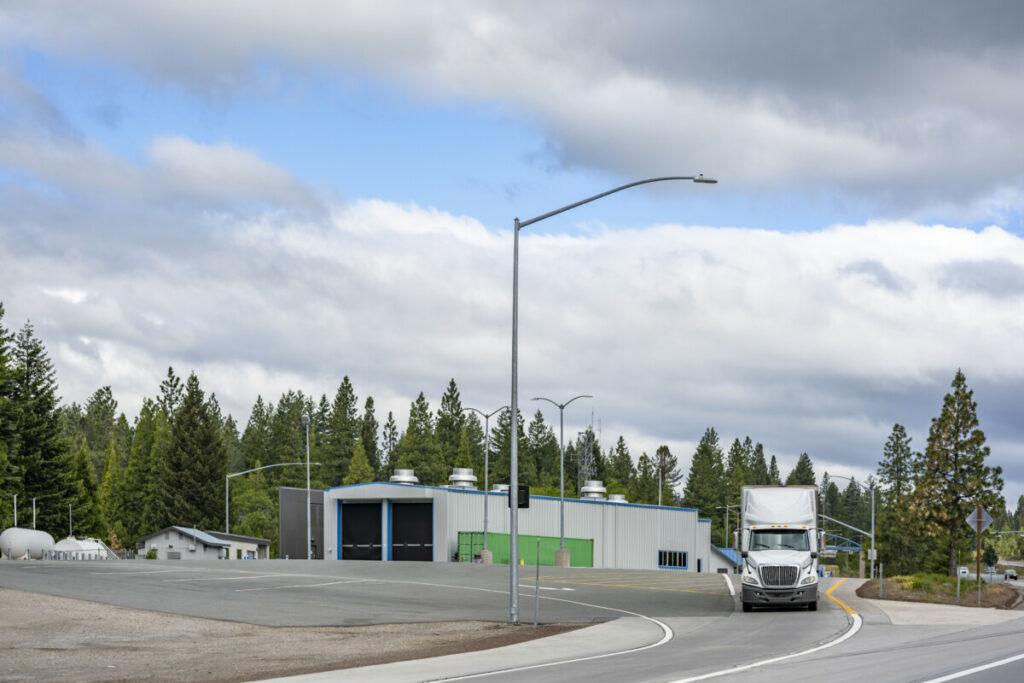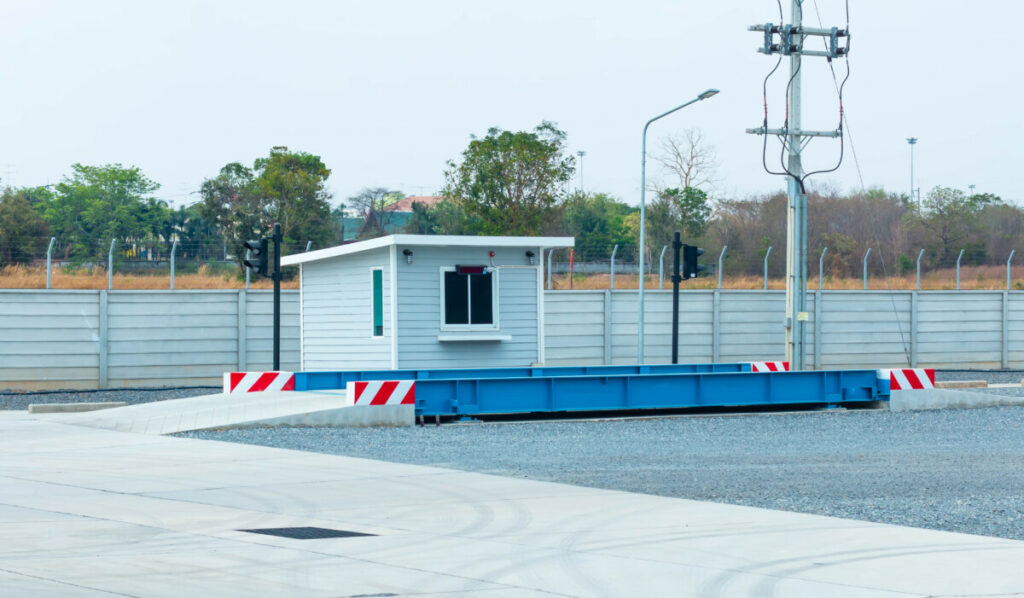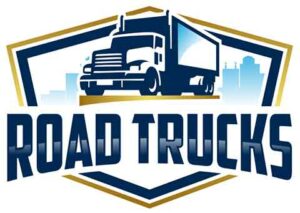Renting and driving a truck is different from renting and driving an ordinary car, and it comes with several things to deal with that you don’t need to consider when using a different vehicle. It’s important to know which complications on the road apply to rental trucks as well as commercial trucks, such as weigh stations. Do rental trucks need to stop at weigh stations?
Rental trucks do not need to stop at weigh stations in most states unless they are being used commercially. Some states require non-commercial vehicles over a certain weight–usually between 7,500 and 18,000 pounds–to stop at weigh stations.
It’s important to understand where rental trucks need to stop at weigh stations and where they don’t. There are also some stipulations to this rule that it is important to note.

Contents
What States Require Rental Trucks To Stop?
There isn’t a national rule in the United States about whether or not rental trucks must stop at weigh stations. In some states, rental trucks are required to stop; in others, they are not required to stop. In some states, they must stop if they are above a certain weight; this maximum weight ranges from 7,500 pounds to 18,000 pounds.
| State | Do Rental Trucks Need to Stop? |
|---|---|
| Alabama | No |
| Alaska | If Over 10,000 pounds |
| Arizona | If Over 10,000 pounds |
| Arkansas | No |
| California | Yes |
| Colorado | No |
| Connecticut | No |
| Deleware | No |
| Florida | Yes |
| Georgia | If Over 10,000 pounds |
| Hawaii | If Over 10,000 pounds |
| Idaho | No |
| Illinois | If Over 16,000 pounds |
| Indiana | Yes |
| Iowa | If Over 10,000 pounds |
| Kansas | If Over 10,000 pounds |
| Kentucky | No |
| Louisiana | No |
| Maine | No |
| Maryland | If Over 10,000 pounds |
| Massachusetts | No |
| Michigan | No |
| Minnesota | If Over 10,000 pounds |
| Mississippi | No |
| Missouri | If over 18,000 pounds |
| Montana | No |
| Nebraska | Yes |
| Nevada | No |
| New Hampshire | No |
| New Jersey | If Over 10,000 pounds |
| New Mexico | No |
| New York | If Over 10,000 pounds |
| North Carolina | If Over 10,000 pounds |
| North Dakota | If Over 10,000 pounds |
| Ohio | If Over 10,000 pounds |
| Oklahoma | No |
| Oregon | If Over 20,000 pounds |
| Pennsylvania | Yes |
| Rhode Island | No |
| South Carolina | Yes |
| South Dakota | If Over 8,000 pounds |
| Tennessee | No |
| Texas | No |
| Utah | No |
| Vermont | Yes |
| Virginia | If Over 7,500 pounds |
| Washington | No |
| West Virginia | No |
| Wisconsin | If Over 10,000 pounds |
| Wyoming | Yes |
8 States Require Stops
Rental trucks must stop at weigh stations no matter their weight or if they are carrying personal property: California, Florida, Indiana, Nebraska, Pennsylvania, South Carolina, Vermont, and Wyoming. In Florida, rental trucks carrying personal property must only stop at Agricultural Inspection Stations, which are usually at the state border, rather than at every weigh station.
19 States Require If Certain Weight Is Above:
Rental trucks need to stop at weigh stations if they are above a certain weight. In Virginia, rental trucks must stop if they weigh more than 7,500 pounds, and in South Dakota, they must stop if they weigh more than 8,000 pounds. In 14 states, the maximum to skip weigh stations is 10,000 pounds; these states are Alaska, Arizona, Georgia, Hawaii, Iowa, Kansas, Maryland, Minnesota, New Jersey, New York, North Carolina, North Dakota, Ohio, and Wisconsin. In Illinois, Missouri, and Oregon, the maximum weights are 16,000 pounds, 18,000 pounds, and 20,000 pounds, respectively.
The Remaining States
In the remaining 23 states, rental trucks are not required to stop at weigh stations. In 3 of these states–Alabama, Idaho, and Montana–all trucks are required to stop if they are greater than 26,000 pounds, but the maximum weight of rental trucks is 26,000 pounds, so it doesn’t matter to those driving a rental truck. In the rest of the states, trucks carrying personal property are off the hook and not required to stop at weigh stations, so you should be good to go.
Weigh Stations information
Most weigh stations will have signs around them that say whether or not rental trucks are required to stop. If a sign at the weigh station says that all commercial vehicles must stop, then rental trucks are not required to stop at that weigh station. If the sign says that all trucks must stop, that means that you are likely required to stop at the weigh station.
Not all stations will have a sign specifying if rental trucks need to stop, so it is a good idea to take note of the laws in each state that you are going to drive through so that, if there isn’t a sign at a weigh station, you will know if that state requires rental trucks to stop. It is also important that you know the weight of your truck so that you know if you need to stop at weigh specific weigh stations. Remember that some states have higher maximum weights than others, so take note of that when figuring out which states you need to stop at weigh stations in.
Worst case scenario, if you aren’t sure whether you need to stop at a weigh station or not, stop at the weigh station. It is not illegal to stop at weigh stations if you don’t need to, so if you aren’t sure of the requirements, it’s best to be cautious and stop. If you aren’t required to stop, you will be waved through the station and be able to head on your way with little delay. It’s better to lose a couple of minutes to stop at a weigh station than be ticketed for not stopping.
Unfortunately, there isn’t a universal rule for rental trucks throughout the country. As it is, make sure that you pay attention to which state you’re going to and what the rules are so that you remember to pay attention to and stop at weigh stations where you are required to stop. If you don’t want to have to stop at weigh stations, you may need to find someone else to drive the truck or hire a driver.
What Happens When I Don’t Stop at a Weigh Station When Required?

Since figuring out where you need to stop at weigh stations can be complicated and stopping at weigh stations can be inconvenient, especially when they are crowded, it may be tempting to pass by weigh stations without going through. Before deciding to do that, instead of stopping like you’re supposed to, you should know what will happen if you do.
Not passing through a weigh station when you are supposed to be illegal. Weigh stations generally have state troopers, highway patrol, or chase staff available to chase down any trucks that drive past a weigh station when they are supposed to stop, and many of these employees don’t have anything to do other than sit and wait for trucks to skip the weigh station. Though some weigh stations won’t have people available to pull you over, you should probably assume that they will. If you don’t stop at a weigh station when you’re supposed to, you will likely be pulled over within a few miles of the weigh station.
When you are pulled over for skipping a weigh station, you are given a ticket just like when you commit any other driving violation. These tickets can be very expensive, and if you are on a long trip, you will rack up quite a few of them by blowing past weigh stations. Though the costs of the tickets vary depending on the state, you can assume that it won’t be cheap.
What Are Weigh Stations For?
Roads take a lot of weight and force from hundreds of cars that pass through them daily. Trucks, especially commercial ones that carry heavy loads, put particular strain on roads and bridges. Trucks are also the most dangerous vehicles because they are larger, harder to handle, and have larger blind spots than ordinary cars. They also are more difficult to turn and have a chance of rolling over, and they take more time to come to a stop.
To mitigate these safety concerns, there are weight laws for trucks and other heavy vehicles. Trucks must weigh under 80,000 pounds, which includes both the weight of the actual truck and the weight of its contents. Some trucks will be overloaded in an effort to save money, which is why weigh stations exist.
Weigh stations ensure that all trucks on the road are within the legal weight limit. This holds drivers and companies accountable for keeping track of their weight and not exceeding the legal limit. Trucks are weighed on large scales on the road, and drivers don’t even need to come to a stop to be weighed. Trucks that are under 80,000 pounds can then pass through the station and head on their way.
Sometimes, the weight is not the only thing checked. Sometimes, regulators may use a weigh station as an opportunity to check a driver’s logs. Commercial truck drivers must keep logs of the number of hours they have been driving and how often they take breaks. Because driving requires a lot of focus and alertness, especially when driving a large vehicle, commercial truck drivers are required to take breaks after a certain number of hours so that they can get some rest to prepare for more driving. If you are driving a rental truck for personal use, you won’t have to worry about driver’s logs.
How Does a Weigh Station Work?

If you discover that you’re going to have to stop at weigh stations, you should probably know how they work so you can get through them quickly and efficiently.
A weigh station will have a sign a quarter mile to a mile ahead of it telling truckers that there is a weigh station coming up. Not all weigh stations are open all the time, so there is usually a light or sign showing whether the weigh station is open or closed. If the weigh station is open, trucks will exit the highway into the weigh station, where there will be one or more lanes.
Some weigh stations have a rolling scale, so trucks don’t need to stop on the scale, but others will require trucks to come to a complete stop. There will be a sign before the scale telling you if you need to come to a stop or how fast you should go over the scale. The weights of trucks are logged into a computer that will display a green light if your truck is light enough to pass through.
If a truck is not light enough to pass through, it will be stopped. Overloaded trucks are fined, and they must unload until they are within the weight limit. This requires the company to send another truck to pick up the leftover materials, which costs time and money. This gives companies a reason to keep their trucks within the legal weight limit because if they don’t, they have to spend a lot of money to rectify it.
Trucks may also be stopped if the attendants at the weigh station see damage or wear on the truck, such as leaks or cracks. Trucks are required to be safe and operative so that there is no damage or injury to the truck, driver, or other cars and people.
Commercial Vs. Privately Used Vehicle
Rental trucks are only exempt from certain weigh stations if they are being driven for personal use and not commercial use. If you are using the truck to transport your own property from one place to another, such as if you’re driving a moving truck to move to another state, you are not driving commercially; this is the case even if you rented the truck, despite the fact that renting a truck means that there is still a commercial element.
If you’re planning on selling the cargo that you are driving in the truck or if you are being paid to drive it somewhere by someone else, that is a different story. Commercial trucks almost always need to stop at weigh stations, even if you rented the truck rather than owning it yourself. If you hire or are hired as a driver of a rental truck, needing to stop at weigh stations depends on the state and the weight of the truck.

